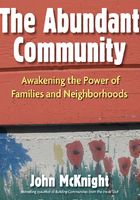
PART I
The Shift from Citizen to Consumer
A CITIZEN IS ONE who is a participant in a democracy, regardless of their legal status. It is one who chooses to create the life, the neighborhood, the world from their own gifts and the gifts of others. Many who have the full legal rights assigned by their country continue to wait for others to provide them with satisfaction and contribute little to democracy or the well-being of their community. At the same time, there are major contributors to community and democracy who do not enjoy the legal status of “citizenship.” We would still consider these people to be citizens because they function as full participants in what is necessary for a democracy to work.
A consumer is one who has surrendered to others the power to provide what is essential for a full and satisfied life. This act of surrender goes by many names: client, patient, student, audience, fan, shopper. All customers, not citizens. Consumerism is not about shopping, but about the transformation of citizens into consumers.
Our intention in part 1 is to look at what happens to the family, the neighborhood, and the community when we make the shift from citizen to consumer. When we go to the marketplace and the professional to seek satisfaction, something happens to our capacity to prosper and find peace of mind. Our premise is that these cannot be purchased.
Our larger purpose, fulfilled in later chapters, is to describe a few powerful and simple actions to do something about this. To reclaim the role of citizen. To move from individualist/spectator into community. To go from addiction to choice. This is the shift that will simultaneously restore vital functions to the family and the neighborhood and reconstruct the competence of community—all of which come under assault in a consumer culture.